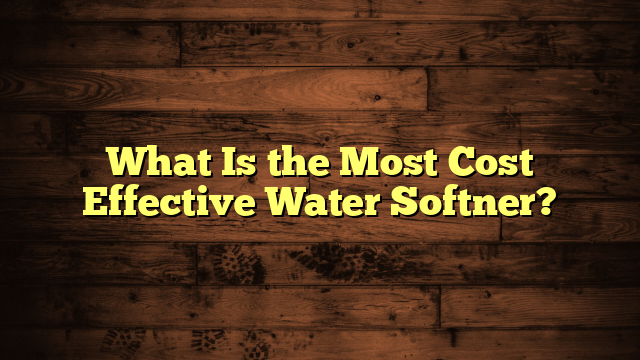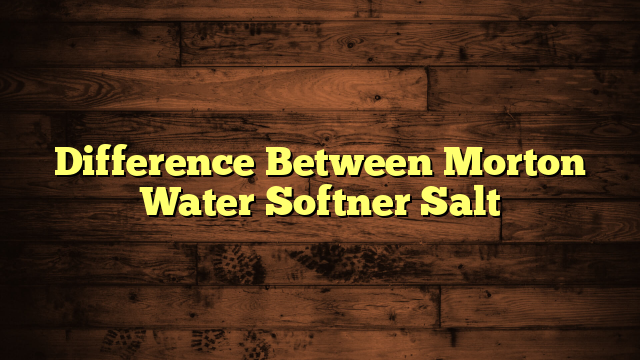Does Water Softner Remove Chlorine?
You might be surprised to learn that water softeners aren't designed to remove chlorine from your water supply. Their primary role is to combat hardness caused by minerals like calcium and magnesium, not to filter out chemical contaminants. This limitation raises an important question about the overall quality of your water and the best ways to manage it. If you're considering a water treatment system, understanding what your softener can and cannot do is essential for ensuring you're effectively addressing all your water quality concerns.
Key Takeaways
- Water softeners primarily address hard minerals like calcium and magnesium, not chlorine.
- They use an ion exchange mechanism that replaces hard minerals with sodium or potassium ions.
- Chlorine, used for disinfection, is not removed during the water softening process.
- Additional filtration methods, such as activated carbon filters, are necessary for chlorine removal.
- Regular water quality testing helps identify chlorine levels and the effectiveness of treatment systems.
Understanding Water Softeners
When it comes to improving your home's water quality, many people turn to water softeners. These devices tackle water hardness, which is caused by minerals like calcium and magnesium. When you use hard water, you may notice scale buildup in your appliances and plumbing, making them less efficient.
A water softener helps to combat these issues through a softening process that replaces those hard minerals with sodium or potassium ions.
During this softening process, your system draws water into a resin tank filled with tiny beads coated in sodium ions. As hard water passes through, the calcium and magnesium ions cling to the beads, while sodium ions are released into the water. This exchange markedly reduces water hardness, leading to benefits like softer skin, shinier hair, and cleaner dishes.
It's important to remember that while water softeners improve water quality by addressing hardness, they don't remove chlorine or other contaminants. If you're concerned about those elements, you'll need to explore additional filtration methods.
Understanding how water softeners work helps you make informed decisions for your home's water needs.
What Is Chlorine?
Chlorine is a chemical element commonly used in water treatment to kill bacteria and other pathogens, ensuring that the water you drink and use is safe.
You'll find that chlorine sources include municipal water supplies, swimming pools, and even some household cleaners. Its effectiveness in disinfection makes it a popular choice, but it's crucial to understand the chlorine effects on both health and the environment.
While chlorine helps eliminate harmful microorganisms, it can also lead to unwanted byproducts. For instance, when chlorine reacts with organic matter in water, it can form chloramines and trihalomethanes, which may pose health risks over time.
You might notice a strong smell or taste when chlorine levels are high, and these can be off-putting, to say the least.
Moreover, excessive chlorine exposure can irritate your skin, eyes, and respiratory system. Understanding these factors can help you make informed decisions about your water quality and treatment options.
Water Softener Mechanism
A water softener typically uses a process called ion exchange to remove hard minerals like calcium and magnesium from your water. This process involves swapping these hard minerals with sodium ions, which helps to prevent scale buildup in your plumbing and appliances.
Here's how it works:
- Resin Beads: The water softener contains resin beads that are charged with sodium ions. When hard water passes through, the beads attract and hold onto the calcium and magnesium ions.
- Ion Exchange Process: As the resin beads grab the hard minerals, they release sodium ions back into the water. This ion exchange effectively softens the water.
- Regeneration Cycle: Eventually, the beads become saturated with hard minerals. To regenerate them, you'll run a brine solution through the system, replenishing the sodium ions and flushing out the accumulated minerals.
There are various water softener types, each utilizing this ion exchange principle in its own way.
Understanding how these systems operate can help you choose the right one for your needs, ensuring that your water remains free of hard minerals while maintaining its quality.
Chlorine Removal Limitations
While water softeners effectively address hard minerals, they don't remove chlorine from your water supply. This limitation can be surprising, especially since chlorine is a common component in many municipal water systems.
There are two main chlorine types you might encounter: free chlorine and combined chlorine. Free chlorine is often used for disinfection, while combined chlorine results from chlorine reacting with organic matter.
When it comes to water treatment, softeners excel in filtering out calcium and magnesium but lack the necessary filtration mechanisms to eliminate chlorine effectively. If you rely solely on a water softener, you might still be exposed to unwanted chlorine in your drinking and bathing water.
This exposure can lead to various issues, including skin irritation and an unpleasant taste or smell.
To guarantee you're getting quality water, you'll need to look into additional treatment methods specifically designed for chlorine removal. Understanding these limitations is vital for maintaining healthy water in your home.
Alternatives for Chlorine Removal
If you're looking to remove chlorine from your water, there are several effective alternatives you can consider.
Activated carbon filters and reverse osmosis systems are popular choices that can greatly reduce chlorine levels, while chemical neutralization methods offer another route.
Each option has its benefits, so it's worth exploring which one suits your needs best.
Activated Carbon Filters
Clarity in drinking water is vital, and activated carbon filters offer an effective solution for chlorine removal. These filters work by adsorbing chlorine and other contaminants, guaranteeing your water tastes and smells better.
Here's why you should consider using them:
- Activated Carbon Effectiveness: These filters are incredibly efficient at removing chlorine, often achieving over 90% reduction in levels.
- Cost-Effective: Compared to other methods, activated carbon filters are generally affordable and easy to install.
- Simple Maintenance: Maintaining your carbon filter is straightforward; just replace the cartridge as needed to keep it functioning at its best.
To verify you're maximizing activated carbon effectiveness, regular carbon filter maintenance is important. Depending on your water quality and usage, you should replace the filter cartridge every 6 to 12 months.
Neglecting this can lead to reduced performance, allowing chlorine and other impurities to slip through. By using activated carbon filters, you're taking a proactive step towards cleaner, safer drinking water.
Make sure to choose a reputable brand and follow the manufacturer's guidelines for the best results. You'll appreciate the difference in taste and overall quality!
Reverse Osmosis Systems
Reverse osmosis systems provide a powerful alternative for removing chlorine and other contaminants from your drinking water. These systems utilize a semi-permeable membrane to filter out impurities, guaranteeing high filtration efficiency. When water passes through the membrane, chlorine, heavy metals, and various other harmful substances are effectively separated from the clean water you consume.
One of the key reverse osmosis benefits is its ability to considerably improve the taste and odor of your water. With chlorine removed, you'll notice that your drinking water is fresher and more appealing. Furthermore, reverse osmosis systems can reduce the presence of other contaminants, making your water safer for you and your family.
Installing a reverse osmosis system can be a wise investment in your health. It's important to remember that these systems typically require regular maintenance, such as replacing filters and membranes, to guarantee peak performance.
However, the long-term benefits far outweigh the maintenance effort, providing you with peace of mind regarding your water quality. If you're looking for an effective solution to chlorine and other impurities, a reverse osmosis system might just be the answer you need.
Chemical Neutralization Methods
Chemical neutralization methods offer effective alternatives for removing chlorine from your water supply.
These methods rely on specific chemical reactions that break down chlorine, making your water safer and more palatable. If you're considering alternative options, here are three popular techniques:
- Sodium Thiosulfate: This compound reacts with chlorine, neutralizing it quickly. Just add the right amount based on your water volume, and you're good to go!
- Activated Carbon Filtration: This method uses specialized filtration techniques to adsorb chlorine from your water. It's efficient, and you can easily install a carbon filter in your home.
- Ascorbic Acid (Vitamin C): Surprisingly, Vitamin C can also neutralize chlorine. By adding ascorbic acid to your water, you'll initiate a chemical reaction that eliminates chlorine effectively.
Using these methods, you can guarantee your water is free from chlorine and safe for consumption.
Remember, while water softeners are great for hardness, they don't remove chlorine.
Benefits of Water Softeners
Water softeners offer several significant benefits that can enhance your daily life.
By improving water quality, they not only protect your appliances but also contribute to healthier skin and hair.
When you invest in a water softener, you're making a choice that pays off in long-term comfort and convenience.
Improved Water Quality
A water softener greatly enhances water quality by removing hard minerals like calcium and magnesium, which can lead to scale buildup and reduced appliance efficiency.
The benefits are clear, and you'll likely notice a significant difference in your everyday water use.
Here are three key improvements you can expect:
- Water Clarity: Softened water often appears clearer and more inviting, making it a pleasure to use for drinking and cooking.
- Taste Improvement: You'll enjoy better-tasting water, as the removal of hard minerals helps eliminate any unpleasant flavors, giving your beverages and meals a fresher taste.
- Easier Cleaning: Softened water reduces soap scum and mineral deposits, making it easier to clean dishes, surfaces, and laundry, resulting in less scrubbing and more sparkling results.
Enhanced Appliance Lifespan
With improved water quality comes the added benefit of enhanced appliance lifespan. When you use a water softener, you reduce mineral buildup, which is a common culprit behind appliance failure. This means your appliances, like dishwashers and washing machines, can run more efficiently and last longer. Regular appliance maintenance becomes easier too, as softened water helps prevent scale deposits that can clog pipes and hinder performance.
Here's a quick look at how water softeners can positively impact your appliances:
| Appliance Type | Benefit of Softened Water | Extended Warranty Consideration |
|---|---|---|
| Dishwasher | Reduces mineral buildup | Longer lifespan might qualify you for extended warranties. |
| Washing Machine | Prevents lint and scale issues | Maintained efficiency can support warranty claims. |
| Water Heater | Increases heating efficiency | A longer-lasting unit may lead to lower repair costs. |
| Coffee Maker | Improves flavor and longevity | Potentially fewer replacements needed. |
Softer Skin and Hair
Using a water softener can transform your bathing experience by making your skin and hair feel noticeably softer.
You'll enjoy several skin benefits and improved hair hydration, which can greatly enhance your daily routine. Here are three key advantages:
- Smoother Skin: Softened water reduces the harshness of minerals that can dry out your skin, leaving it feeling silky and smooth after each shower or bath.
- Moisturized Hair: Hard water often leads to brittle hair. With a water softener, you'll notice improved hydration, making your locks easier to manage and style.
- Reduced Irritation: Soft water helps alleviate skin irritations and conditions, such as eczema, by minimizing exposure to harsh chemicals and minerals.
When you switch to soft water, you'll likely feel a difference in how your skin and hair respond.
The moisturizing effects can help you maintain a fresh, healthy appearance.
So, if you're looking to enhance your bathing experience, a water softener might just be the solution you need!
Enjoy the benefits of softer skin and hydrated hair, elevating your self-care routine to a whole new level.
Testing Water Quality
Testing water quality is essential for guaranteeing the safety and effectiveness of your water treatment system. Regular water testing allows you to understand what's in your water and how it may affect your health. A thorough quality assessment helps identify contaminants, such as chlorine, that could negate the benefits of your water softener.
Here's a simple table to help you visualize common water quality issues and their potential impacts:
| Contaminant | Potential Impact | Recommended Action |
|---|---|---|
| Chlorine | Skin irritation, bad taste | Use a water filter |
| Hard minerals | Scale buildup, dry skin | Install a water softener |
| Bacteria | Illness, infections | Disinfect water source |
| Heavy metals | Neurological issues, toxicity | Use a reverse osmosis system |
Understanding these elements can empower you to make informed decisions about your water treatment system. By actively engaging in water testing and quality assessment, you'll guarantee that your water is both safe and pleasant to use. Remember, knowledge is key! Regular tests lead to better water quality, ultimately enhancing your health and comfort at home.
Choosing the Right System
Choosing the right water treatment system can feel overwhelming, but it's essential for ensuring your water meets your needs.
With various system types available, you'll want to carefully analyze which one suits your situation best. Here's a quick guide to help you make that decision:
- Water Softening Systems: These systems reduce hardness minerals like calcium and magnesium, improving the feel and efficiency of your water.
- Activated Carbon Filters: Ideal for removing chlorine and other contaminants, these filters enhance taste and odor in your drinking water.
- Reverse Osmosis Systems: Offering thorough purification, these systems eliminate a wide range of impurities, making your water cleaner and safer.
When selecting a system, consider a cost analysis to understand initial investment versus long-term savings.
Factor in maintenance costs and replacement filters, since these can add up over time.
By analyzing your water quality and usage patterns, you can make an informed choice that aligns with your budget and needs.
Remember, the right system not only improves your water quality but also enhances your overall health and home comfort.
Don't hesitate to reach out to professionals for guidance tailored to your specific circumstances.
Frequently Asked Questions
Can Water Softeners Improve Skin and Hair Health?
Water softeners can greatly improve your skin and hair health. Soft water benefits your body by enhancing skin hydration, reducing dryness, and making hair softer and shinier. You'll notice a difference after switching to soft water.
How Often Should I Maintain My Water Softener?
Imagine your water softener as a trusty steed. To keep it galloping smoothly, you should check its salt levels monthly and perform maintenance every six months for peak performance and longevity. Regular water softener maintenance is key!
Do Water Softeners Increase Water Pressure?
Water softeners typically don't increase water pressure. They can slightly affect flow rate due to the resin, but the difference is usually minimal. If you're experiencing low pressure, check your system or plumbing for issues.
Can I Use a Water Softener for Drinking Water?
You'll feel like a hydration superhero when you use a water softener for drinking water! It can improve water quality, but remember, it doesn't remove contaminants. Always check if it meets your specific needs for safe consumption.
Are There Environmental Impacts of Using Water Softeners?
Water softeners can have environmental impacts, particularly through chemical runoff. When you use them, the salt and chemicals can contaminate local water sources, affecting ecosystems. It's crucial to evaluate these consequences before installation.
Conclusion
To sum up, while water softeners effectively tackle hard minerals, they don't remove chlorine from your water. Curiously, about 70% of households in the U.S. rely on municipal water systems that contain chlorine for disinfection. To truly improve your water quality, consider combining a water softener with additional filtration methods, like activated carbon filters. This way, you can enjoy soft, clean water that's free from both hardness and unwanted chemicals, ensuring a healthier lifestyle for you and your family.







